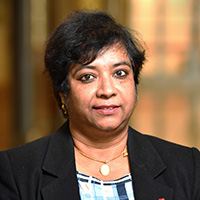 Susmita Bose, Washington State University
Susmita Bose, Washington State University
Susmita Bose is the Westinghouse Distinguished Professor at the School of Mechanical and Materials Engineering, affiliate faculty of the Department of Chemistry, and Elson Floyd College of Medicine at Washington State University. Prof. Bose's interdisciplinary research interest lies at the interface of Chemistry, Materials Science, Mechanical Engineering, Bioengineering, and Biology, focusing on 3D-printed bone scaffolds, implant materials, and
drug delivery vehicles. Prof. Bose received the CAREER award in 2002 and the prestigious Presidential Early Career Award for Scientists and Engineers (PECASE) from the National Science Foundation. She has advised over 45 graduate students for their MS and Ph.D., and over 40 undergraduate students in research, and published over 300 technical articles, including over 250 journal articles, 24 book chapters, 9 edited books, 13 issued patents. Her research papers have been cited over 31,200 times, "h" index 90 (Google Scholar). She is a fellow of the American Association for the Advancement of Science (AAAS), the National Academy of Inventors (NAI), the Materials Research Society (MRS), ASM International, the American Institute for Medical and Biological Engineering (AIMBE), the American Ceramic Society (ACerS) and the Royal Society of Chemistry (RSC). She received the PACE and Fulrath Awards from the American Ceramic Society. In 2015, Prof. Bose was named Life Science Innovation Northwest Women to Watch Honoree by the Washington Biotechnology and Biomedical Association. In 2016, she received the International Society for Ceramics in Medicine research excellence award. In 2017 she was elected to the Washington State Academy of Sciences; in 2018, she received WSU distinguished faculty award, and in 2019 WSU Sahlin faculty excellence award for research scholarships and art. Since 2011, Dr. Bose's group's research on 3D printed ceramic bone scaffolds with controlled chemistry for hard tissue engineering, and natural medicinal compounds were featured by the AP, BBC, NPR, CBS News, MSNBC, ABC News, and many other TV, radio stations, magazines and news sites all over the world, including R&D magazine, Science Daily News, etc.